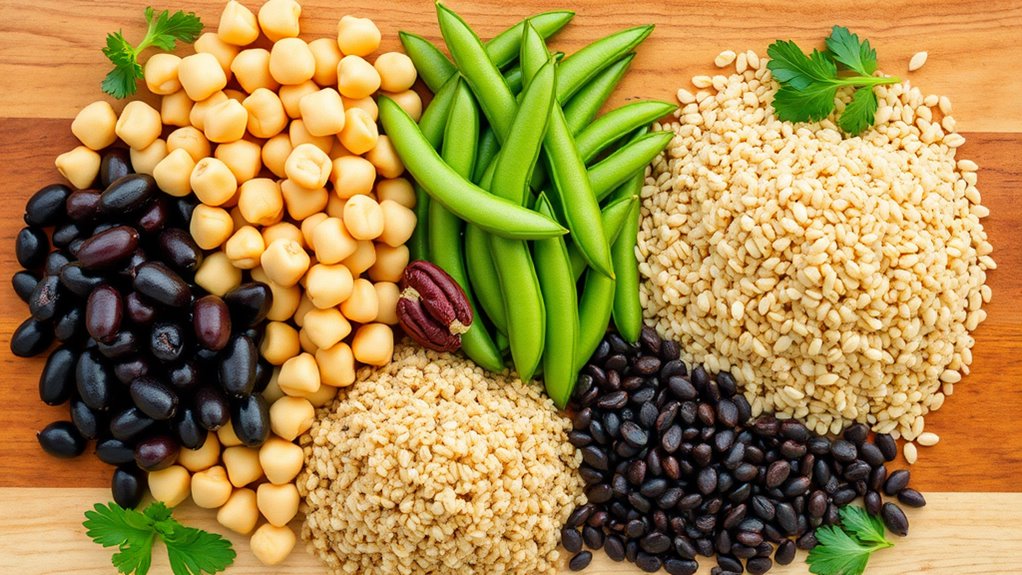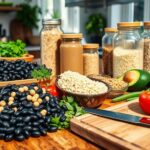If you're looking for the top plant-based protein sources as a vegan, consider incorporating lentils, chickpeas, and quinoa into your meals. Tofu and tempeh offer versatility and substantial protein, with tempeh providing 31 grams per cup. Don't forget about chia and hemp seeds, which are packed with nutrients. Peas and a variety of nuts, especially almonds and walnuts, also add protein while delivering healthy fats. These options ensure you obtain a well-rounded intake of essential amino acids. Curious about more protein sources and how to include them? There's plenty more to explore that can enrich your plant-based diet.
Key Takeaways
- Legumes like lentils and chickpeas are excellent protein sources, providing 18g and 15g of protein per cooked cup, respectively.
- Seeds such as hemp and chia seeds offer complete proteins, along with healthy fats and essential nutrients.
- Quinoa stands out as a complete protein grain, containing all nine essential amino acids in each serving.
- Nuts and nut butters, like almonds and walnuts, provide protein and healthy fats, enhancing overall nutrition.
- Plant-based alternatives like tempeh and edamame are high in protein, with tempeh offering 31g per cup.
Lentils
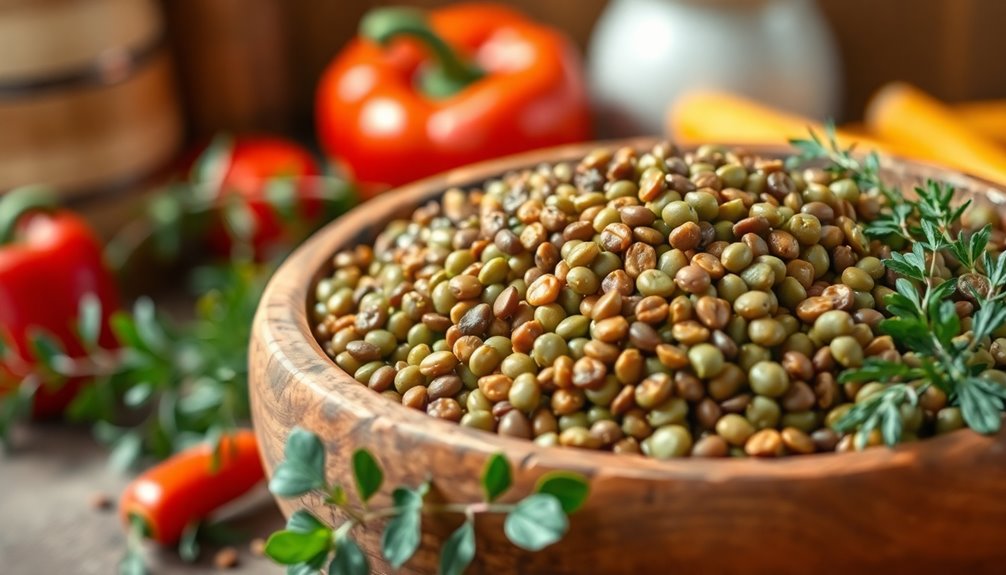
When it comes to plant-based protein sources, lentils stand out as a powerhouse. Packed with essential nutrients, they're a fantastic choice for anyone looking to boost their protein intake while enjoying delicious meals. Lentils aren't just versatile; they also offer impressive lentil nutrition facts.
A single cup of cooked lentils provides around 18 grams of protein, making them an excellent option for vegans and vegetarians alike. Moreover, lentils are rich in dietary fiber, iron, and folate, contributing to overall health and well-being. If you're focused on maintaining balanced nutrition, these legumes can easily fit into your diet.
With a low glycemic index, lentils help stabilize blood sugar levels, which is particularly beneficial for those managing diabetes or weight. You can explore a variety of lentil recipes to keep your meals exciting. From hearty lentil soups to spicy lentil curries, or even lentil salads, there's something for everyone.
They absorb flavors beautifully, making them a perfect base for countless culinary creations. Incorporating lentils into your diet can foster a sense of community as you share your favorite recipes with friends and family. With their affordability and accessibility, it's easy to see why lentils have become a staple in many households. Additionally, lentils are known for their nutritional benefits, which can significantly enhance your overall health.
Chickpeas
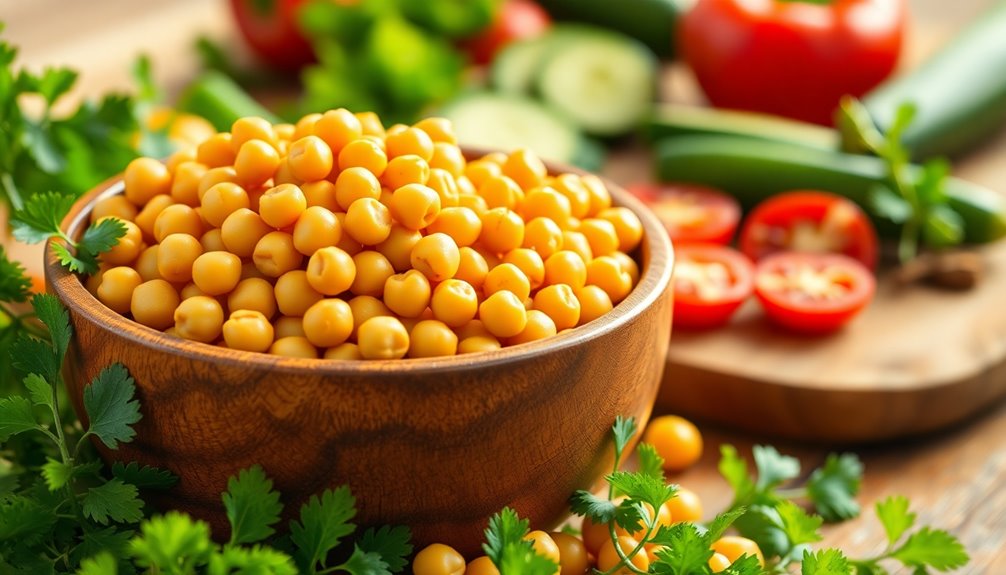
Have you ever considered the nutritional benefits of chickpeas? These little legumes aren't only versatile but also packed with nutrients that can support your vegan lifestyle. Chickpeas boast impressive chickpea protein content, offering about 15 grams of protein per cooked cup. This makes them an excellent option for those looking to increase their protein intake without animal products.
In addition to their protein, chickpeas are rich in fiber, which aids digestion and keeps you feeling full longer. Their low glycemic index makes them a smart choice for maintaining stable blood sugar levels. Plus, they're loaded with essential vitamins and minerals, including folate, iron, and magnesium, making them a great addition to any meal. Furthermore, chickpeas are a fantastic source of plant-based protein that can enhance energy levels and support muscle recovery.
You might enjoy exploring chickpea flour recipes, which allow you to use chickpeas in creative ways. Chickpea flour, or besan, can be used to make savory pancakes, bread, or even a gluten-free pizza crust. Not only do these recipes provide a delightful taste, but they also deliver the nutritional benefits of chickpeas in a new form.
Incorporating chickpeas into your diet is easy. Toss them in salads, blend them into hummus, or add them to soups and stews. Their mild flavor means they can complement a variety of dishes, making them a staple in your plant-based pantry. So, next time you're looking for a nutritious, protein-packed ingredient, don't overlook chickpeas!
Quinoa
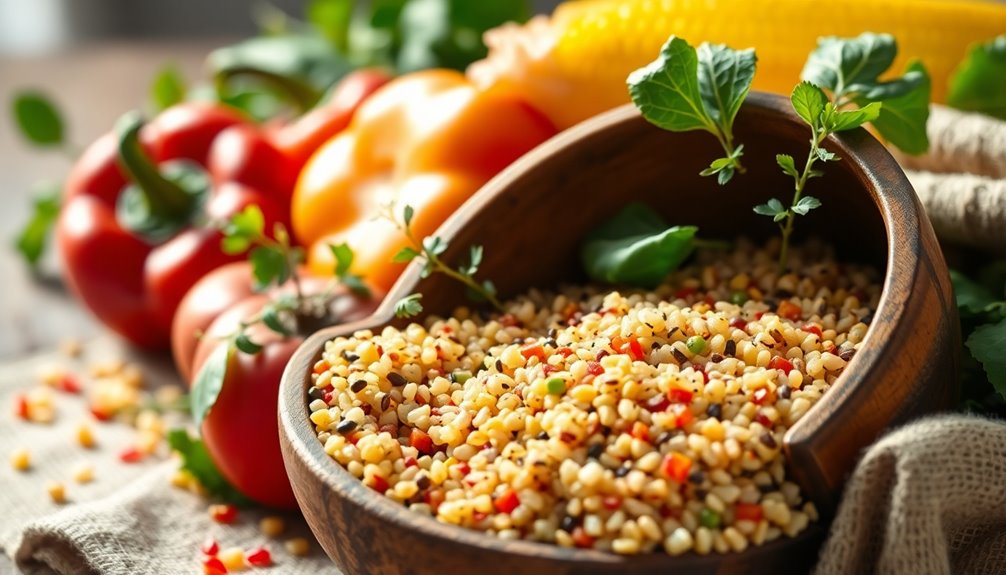
Quinoa is a powerhouse among plant-based protein sources, providing about 8 grams of protein per cooked cup. It's not just a protein-rich option; it also offers a complete amino acid profile, making it a unique choice for vegans looking to meet their nutritional needs. When you're exploring quinoa recipes, you'll find it incredibly versatile—perfect for salads, bowls, or as a side dish.
In terms of quinoa nutrition, it's packed with essential vitamins and minerals, including magnesium, iron, and fiber. This combination can help support your overall health, making it a staple in plant-based diets. You'll also appreciate its low glycemic index, which can aid in maintaining stable energy levels throughout the day.
Quinoa cooking is straightforward. Rinse the seeds to remove the natural coating called saponin, which can taste bitter. Then, cook it in a ratio of two cups of water to one cup of quinoa, bringing it to a boil before simmering until fluffy. This easy preparation allows you to incorporate quinoa into your meals effortlessly.
The quinoa benefits extend beyond its impressive nutrient profile. It's gluten-free, making it suitable for those with gluten sensitivities. Plus, its nutty flavor and chewy texture can add a delightful contrast to your dishes. Additionally, quinoa's ability to contribute to a plant-based diet can help reduce greenhouse gas emissions significantly. Whether you're new to plant-based eating or a seasoned pro, quinoa can enrich your diet and help you feel connected to the vibrant vegan community.
Tofu
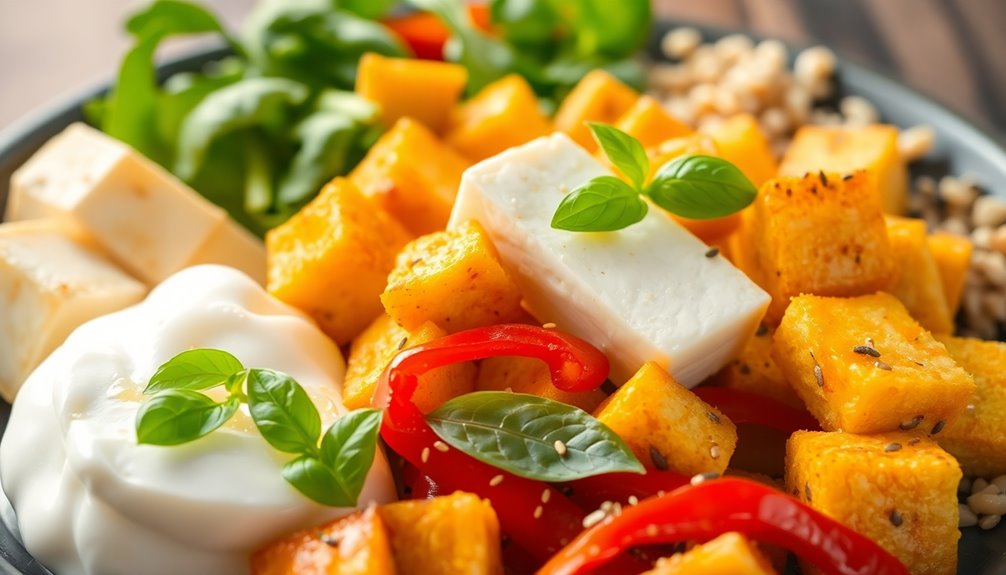
Rich in protein and incredibly versatile, tofu is a staple for many vegans seeking to enhance their diets. Made from soybeans, it packs a solid protein punch, providing about 10 grams per serving. This makes it an excellent choice for anyone looking to meet their protein needs without animal products. Plus, it's low in calories and contains essential amino acids, making it a balanced option for your meals.
When it comes to tofu health benefits, you've got plenty to choose from. Research suggests that incorporating tofu into your diet can support heart health due to its isoflavones, which may help lower cholesterol levels. Additionally, it's a good source of iron and calcium, helping you maintain strong bones and overall wellness.
The excitement of cooking with tofu lies in its adaptability. Whether you enjoy stir-fries, soups, or even desserts, you can easily find tofu recipes that fit your taste. For a savory dish, try marinating and grilling tofu for a delicious BBQ experience.
If you're in the mood for something sweet, blend silken tofu into smoothies or puddings for a creamy texture without the dairy.
With its numerous health benefits and culinary flexibility, tofu can truly elevate your plant-based journey. So, don't hesitate to explore diverse tofu recipes, and experience how this protein-rich food can enhance your meals while keeping you healthy and satisfied. Additionally, tofu is a great source of calcium which is essential for maintaining strong bones and overall wellness.
Tempeh
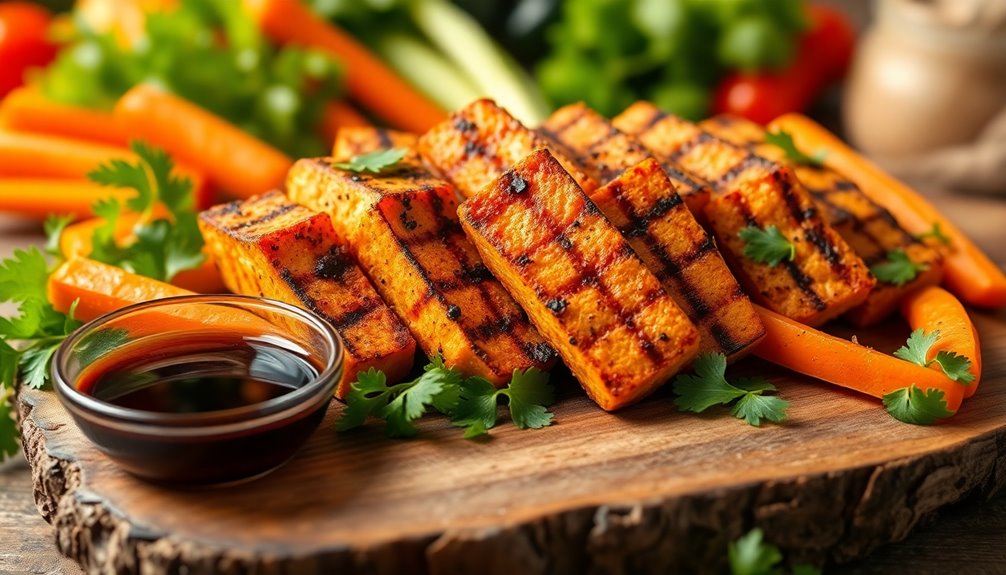
After exploring the versatility of tofu, it's time to turn our attention to tempeh, another fantastic plant-based protein source. This fermented goodness offers a unique texture and flavor profile that can elevate your meals while providing substantial nutrition. Here's what you need to know about tempeh:
- It's packed with protein—about 31 grams per cup!
- Its fermentation process enhances digestibility and nutrient absorption.
- Tempeh is rich in probiotics, promoting gut health.
- It's incredibly versatile, working well in stir-fries, salads, and sandwiches.
Tempeh originates from Indonesia and is made from fermented soybeans, which means it's not just a high protein option for veganism; it's also a source of beneficial microorganisms. This fermentation process not only boosts its nutrient content but also gives it a distinct nutty flavor that pairs beautifully with various ingredients. Additionally, incorporating a diet rich in mind/body exercises can support overall health, including blood pressure management.
Incorporating tempeh into your diet can significantly contribute to your protein intake, making it a staple for anyone pursuing high protein veganism. You can marinate and grill it, crumble it into tacos, or even use it as a meat substitute in your favorite recipes.
With its impressive nutritional profile and culinary versatility, tempeh can help you feel satisfied and nourished. As you explore plant-based options, don't overlook this nutrient-dense gem that fosters both community and health.
It's time to embrace the many benefits of tempeh in your journey toward a vibrant, plant-based lifestyle.
Edamame
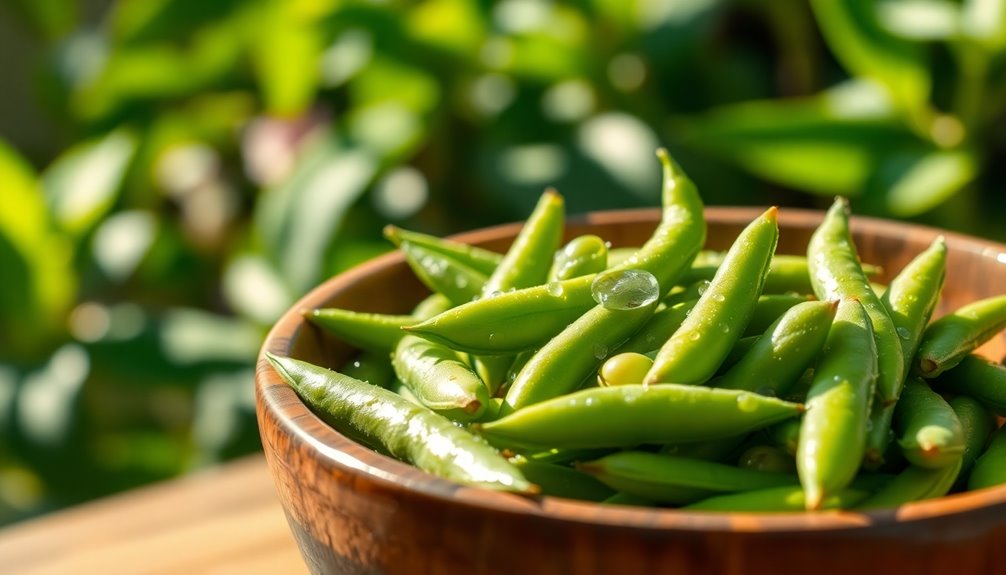
Bright green pods of edamame aren't just a delicious snack; they're also a powerhouse of plant-based protein. These young soybeans pack a punch with about 18 grams of protein per cup, making them an excellent choice for anyone looking to boost their protein intake. Edamame benefits go beyond protein; they're rich in fiber, vitamins, and minerals, contributing to overall health and wellness.
Incorporating edamame into your diet is simple and enjoyable. You can toss them into salads, stir-fries, or grain bowls for a burst of color and nutrition. Their slightly nutty flavor makes them a versatile ingredient in various recipes. Try blending cooked edamame into a creamy dip, or use them as a topping for avocado toast. The options are endless, making it easy to share delicious meals with friends and family.
Additionally, edamame is low in calories and high in antioxidants, which can help fight inflammation and support heart health. Including them in your meals not only adds protein but also contributes to a well-rounded, nutrient-rich diet. As part of a healthy meal plan, edamame can help support rapid and healthy fat loss while enriching your overall nutritional profile.
Whether you're snacking on them plain, seasoned with sea salt, or adding them to your favorite dishes, edamame can easily fit into your lifestyle. Embrace the edamame trend and enjoy the benefits of this nutritious and versatile food, which can help you feel connected to a community that values healthy, plant-based eating.
Chia Seeds
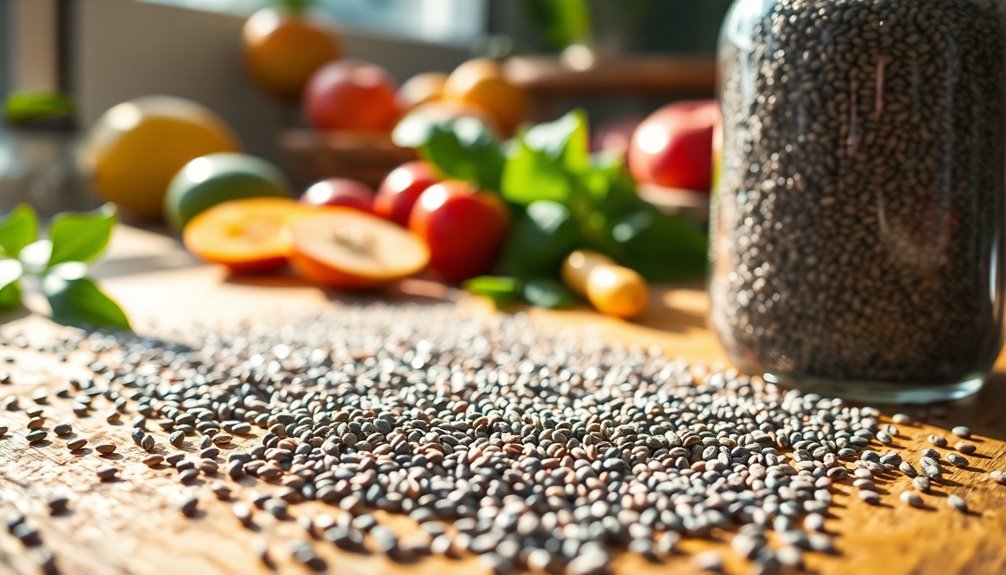
Chia seeds pack a nutritional punch that can elevate your plant-based diet. These tiny seeds are more than just a trendy superfood; they offer a wealth of benefits that can enhance your meals. Here's why you should consider incorporating chia seeds into your daily routine:
- High in protein and essential amino acids
- Rich in omega-3 fatty acids
- Packed with fiber for better digestion
- Great source of antioxidants
One of the most delightful ways to enjoy chia seeds is through chia seed pudding recipes. With just a few ingredients, you can whip up a creamy, nutrient-dense treat that's perfect for breakfast or a snack. Simply mix chia seeds with your choice of plant-based milk, let them soak overnight, and add your favorite fruits or sweeteners in the morning.
If you're looking to boost your smoothies, incorporating chia seeds can add a satisfying texture and extra protein. They absorb liquid and expand, making your smoothies not only thicker but also more filling. Additionally, using chia seeds in your smoothies aligns perfectly with the over 36 fat-melting meal-replacement smoothie recipes included in The Smoothie Diet program.
For a quick energy boost on-the-go, consider making chia seed energy bars. Combine chia seeds with nuts, oats, and a natural sweetener, and you've got a healthy snack that'll fuel your day.
The benefits of chia seeds are clear, and they're an easy addition to your plant-based lifestyle. Whether you're trying new recipes or simply looking for nutritious ingredients, chia seeds can help you achieve your health goals while feeling a sense of belonging in the vibrant vegan community.
Hemp Seeds
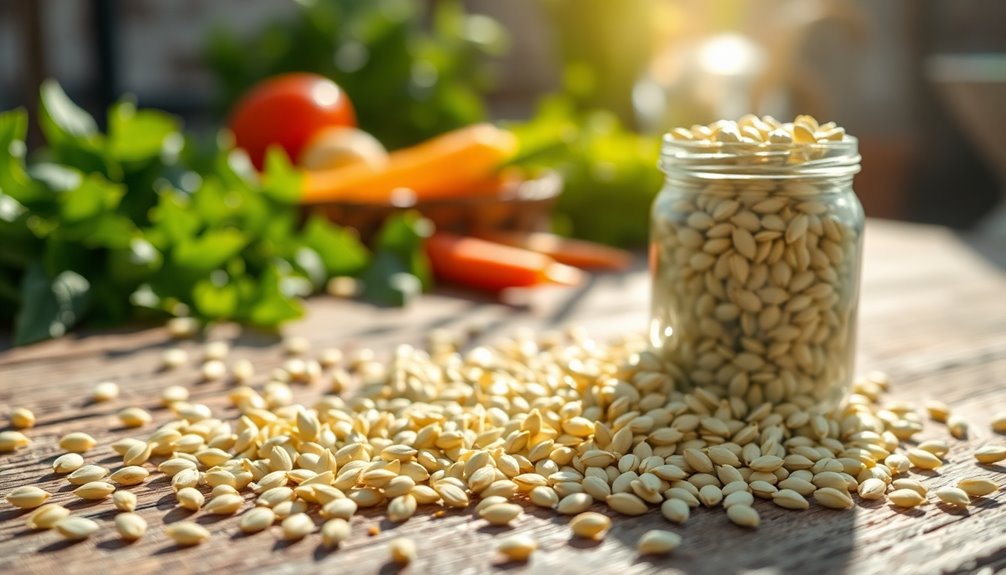
If you're looking to expand your repertoire of plant-based protein sources, hemp seeds deserve a spot on your plate. These tiny seeds pack a powerful nutritional punch, offering about 10 grams of protein per 3 tablespoons, along with essential fatty acids like omega-3 and omega-6. This unique combination makes hemp seeds an excellent addition to your vegan diet, supporting muscle repair and heart health.
Hemp seed benefits go beyond just protein. They're rich in vitamins and minerals, including magnesium, phosphorus, and vitamin E, which are crucial for overall well-being. Their high fiber content can aid digestion and help you feel fuller for longer, making them a great choice for anyone looking to manage their weight or improve gut health. Additionally, incorporating hemp seeds into your routine can help enhance your overall health and vitality, making them an even more valuable addition to your diet.
Incorporating hemp seeds into your meals is easy and versatile. You can sprinkle them on salads, blend them into smoothies, or even use them to make hemp seed pesto. If you're feeling adventurous, try creating hemp seed energy balls or adding them to your favorite baked goods for an extra nutritional boost.
With their nutty flavor and crunchy texture, hemp seeds can enhance just about any dish, fostering a sense of community and creativity in your cooking. So, embrace the benefits of hemp seeds, and experiment with various hemp seed recipes to find what you love most. You'll not only nourish your body but also discover a new favorite ingredient in your plant-based journey.
Peas
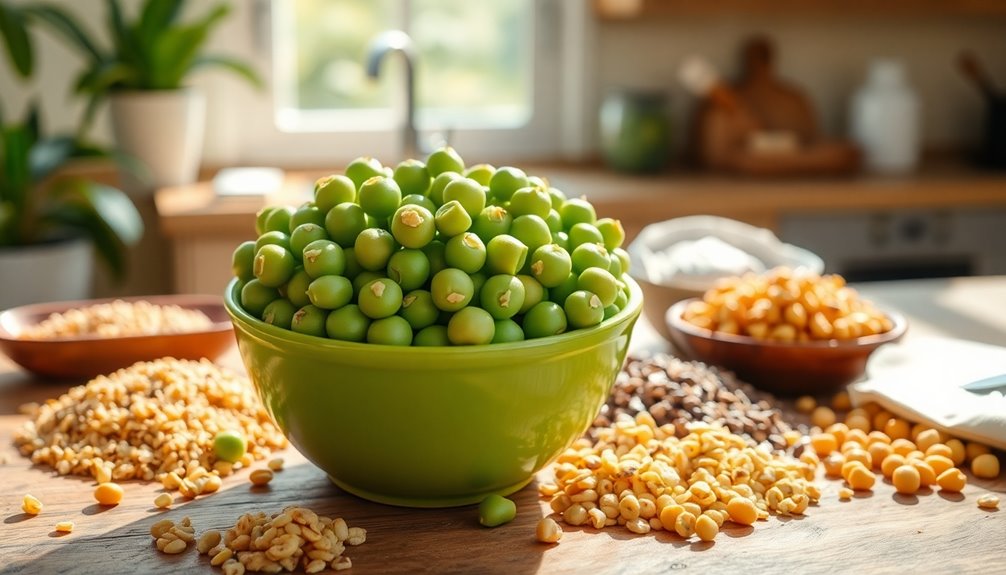
Peas are a powerhouse of plant-based protein, making them an ideal choice for vegans looking to boost their nutritional intake. Packed with essential nutrients, these little green gems can easily be incorporated into your diet. Here are some benefits of peas that you might find appealing:
- High in protein: Peas contain about 8 grams of protein per cup, making them a strong contender in the plant-based protein category.
- Rich in fiber: They help support digestive health and keep you feeling full longer.
- Versatile: You can use peas in a variety of dishes, from soups to salads.
- Nutrient-dense: Peas are loaded with vitamins A, C, and K, as well as minerals like iron and magnesium.
Cooking with peas opens up a world of delicious recipes. You can toss them into stir-fries, blend them into smoothies, or even create a flavorful pea soup.
In addition, pea protein powders are a fantastic supplement for anyone looking to increase their protein intake without consuming animal products. They're often used in protein shakes, baked goods, and even energy bars.
The benefits of peas extend beyond just nutrition; they also foster a sense of community. By sharing recipes and tips on cooking with peas, you can connect with fellow plant-based eaters.
Nuts and Nut Butters
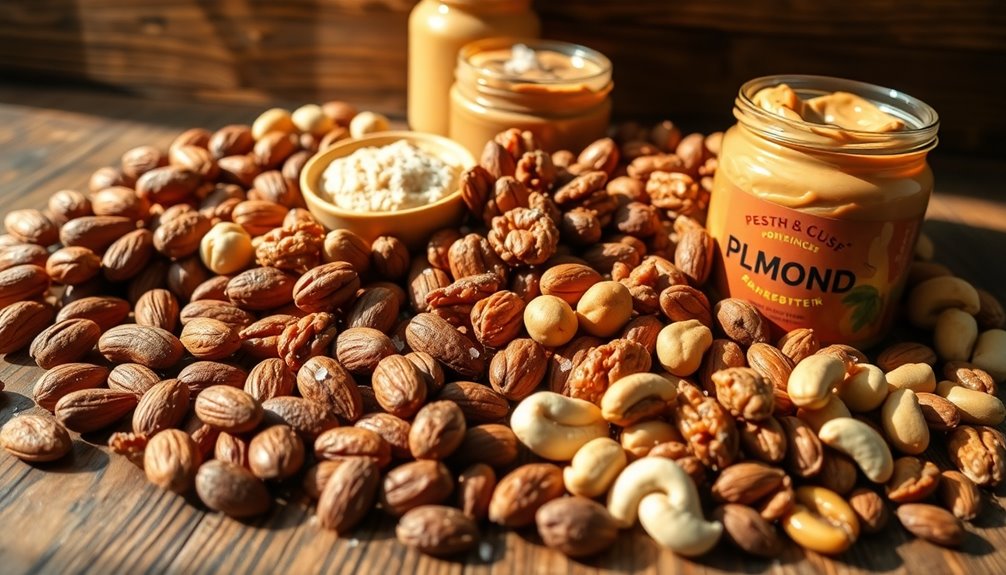
Nuts and nut butters offer another excellent source of plant-based protein for vegans, complementing the nutrient profile of peas quite nicely. They're not only tasty but also packed with essential nutrients that can help you meet your dietary needs. For instance, almonds, walnuts, and peanut butter provide protein, healthy fats, and fiber—all vital for a balanced vegan diet. Additionally, incorporating variety in meals can enhance your overall satisfaction while following a plant-based lifestyle.
Here's a quick comparison of some popular nut sources:
| Nut Type | Protein per 100g |
|---|---|
| Almonds | 21g |
| Walnuts | 15g |
| Peanut Butter | 25g |
Incorporating nuts and nut butters into your meals can be simple and enjoyable. Whether you're adding almonds to your morning smoothie or spreading almond butter on whole-grain toast, the recipes are endless! However, be mindful of allergies, as some people may react negatively to certain nuts. If you or someone you know has nut allergies, consider substitutions like seeds (pumpkin or sunflower) or seed butters.
The nutritional benefits of nuts and nut butters extend beyond protein; they're also rich in vitamins and minerals. So, whether you're looking to boost your protein intake or simply enjoy a delicious snack, nuts and nut butters are a fantastic choice. Remember, variety is key, so mix and match for the best results!
Frequently Asked Questions
Can Plant-Based Proteins Provide All Essential Amino Acids?
Yes, plant-based proteins can provide all essential amino acids, but it's important to choose wisely. Some sources, like quinoa and soy, are complete proteins, meaning they contain all nine essential amino acids your body needs.
Others, like beans and rice, aren't complete on their own but can complement each other to form a complete profile.
How Can I Combine Proteins for Complete Nutrition?
Imagine a plate filled with vibrant grains and legumes, each bite bursting with flavor. To achieve nutritional balance, you can practice protein combining. Pair rice with beans or quinoa with lentils; each combination provides all essential amino acids.
This approach not only enhances your meals but also guarantees you're fueling your body effectively. By mixing different sources, you create a diverse diet that supports your health and fosters a sense of belonging within the plant-based community.
Are There Any Potential Allergens in These Protein Sources?
When considering allergen concerns, acknowledging that some plant-based protein sources can trigger reactions is crucial. Common allergens comprise soy, nuts, and gluten-containing grains. While these proteins typically provide high protein quality, it's important to be aware of your personal sensitivities.
Always check labels and seek advice from a healthcare provider if uncertain. By doing so, you can maintain a healthy diet without jeopardizing your health or experiencing a sense of seclusion from individuals with comparable dietary choices.
How Much Protein Do I Need Daily on a Vegan Diet?
You need about 46 grams of protein daily if you're a woman and 56 grams if you're a man. However, individual needs can vary based on factors like age, activity level, and overall health.
To meet your daily requirements, focus on diverse protein sources like legumes, nuts, and whole grains. Including a variety guarantees you get all essential amino acids while enjoying a balanced, nutritious vegan diet that supports your health and community.
Can I Get Enough Protein From a Raw Vegan Diet?
Sure, a raw vegan diet can be like a treasure hunt for protein! You can definitely get enough protein, but you might need to be creative. Incorporate nuts, seeds, and legumes into your meals.
If you're struggling, consider nutritional supplements or protein powder alternatives to fill the gaps. Just remember to balance your intake and pay attention to your overall nutrition.
You're not alone on this journey; many thrive with careful planning!
Conclusion
Incorporating these top plant-based protein sources into your diet can elevate your meals while meeting your nutritional needs. For instance, imagine you're a busy vegan professional who starts each day with a smoothie packed with hemp seeds and spinach. You'll feel energized and satisfied, knowing you're fueling your body with quality protein. By diversifying your protein sources, like adding lentils to your soups or enjoying chickpeas in salads, you'll support your health and keep your meals exciting.

